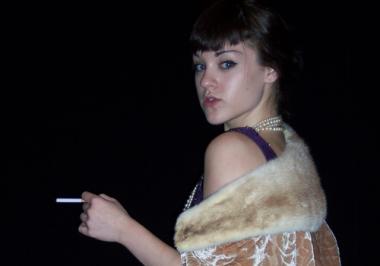The title itself might raise a couple of eyebrows. And the content of Tricky Wicked Bitch could elevate them a little more—especially because this award-winning play, written by a Smith College junior, has been chosen as the production for graduation weekend, when the theater department shows off its work for students’ families.
The play mixes questions of race, gender, identity and belonging into a sexy stew the author describes as “a time-travel lesbian love story.” But Lisa Meyers’ play isn’t really as provocative as its title tries to be. It’s actually quite sweet, in an off-center kind of way. And though it’s not the kind of family-oriented entertainment some campus visitors might be expecting this weekend, Tricky Wicked Bitch is all about family.
Beneath its stylistic experiments, the play is at root an exploration of relations and origins, birth families and chosen families, identities and life choices that break with or affirm family traditions, and about newly grown-up daughters seeking to redeem lost connections with parents—all things that will be on the minds of not a few of this weekend’s graduates and their families.
Meyers’ central (but not title) character is 20-year-old Rose, a mixed-race, lesbian “child of circumstance, product of happenstance, daughter of death.” Another five people circle her in time and space: her mother, Johanna, who hasn’t spoken since before Rose was born because she was told she talked too much; Johanna’s gay friend Henry, who becomes seven-year-old Rose’s father when Johanna kills herself; Justin, Henry’s lover; Sam, Rose’s black biological father; and Wiley, the title character, a beautiful black singer in a 1920s nightclub whom Rose falls in love with and who isn’t, in fact, tricky, wicked or a bitch.
The play takes place in three different time periods— the present, the ’70s and the ’20s—more or less simultaneously, with Rose and Johanna traversing all three. The playwright confesses to more than a touch of magic realism in her script, and cites a lesson from her high school writing mentor, the sci-fi author Tim Powers, that you can make up whatever “rules” you want for your story, so long as you then stick to them.
Meyers also acknowledges the personal traits and interests that informed the play and its people. She’s a 20-year-old lesbian, comes from a mixed marriage (not interracial but Catholic/Jewish), accuses herself of talking too much, and is fascinated by the music and milieu of the black nightclubs in the Jazz Age, where races mixed and performers like Bessie Smith and Ma Rainey hinted at forbidden sexuality in their songs.
The production, directed by Smith senior Sarah Thompson, features an onstage jazz quartet playing original music by Julia Rhinelander and Dennis Chase, and a cast that reflects the realities of casting options at Smith: Wiley isn’t black and Sam and Justin aren’t male.
Meyers’ faculty advisor, Smith theater professor Len Berkman, says, “We find our audiences—even at Commencement, and even coming as families—seeking material that challenges them, in form as well as content. Lisa’s angular, inventive humor, her music mesh, her mercurial perspectives are such an invigoration.”
Tricky Wicked Bitch: May 13-15, 8:30 pm, Hallie Flanagan Studio Theatre, Smith College, Green Street, Northampton, 585-ARTS (2787), www.smith.edu/smitharts.



